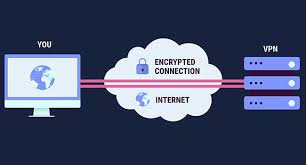BEST VPN
1. ExpressVPN - Best Overall
It’s no big surprise that most of digital security expert team members have iPhones; where they're constantly joining public Wi-Fi networks. ExpressVPN easily connected with fast speeds, and with a kill switch, if the connection was lost, they were still protected.
2. NordVPN - Best Encryption
NordVPN has over nine million customers around the world making it one of the most popular VPNs. I love that NordVPN is based in Panama, a non-member to Five Eyes, Nine Eyes, and 14 Eyes. Legally, the company can never be forced to hand over data, so NordVPN is a great choice for those concerned about privacy.
3. Surfshark - Best VPN for Torrenting
Surfshark made it easy for every one to torrent and download movies and TV shows without fear of retribution. With unlimited devices per subscription, this VPN gives a different IP address every time connected, which makes tracing much harder.
4. CyberGhost - Best VPN for Mac
The company is based in Romania, not a member of those international surveillance networks i keep mentioning; plus, Romania as a country has almost no data retention laws of its own, making CyberGhost a great pick for privacy.
5. IPVanish - Best VPN for Android
IPVanish workes well on Android devices, with strong encryption methods, great download speeds, and split tunneling. Plus, unlike many other VPN companies , IPVanish has really fantastic customer support, available 24/7 over email, phone, or live chat.
6. Private Internet Access - Best VPN for Windows
If you have a Windows computer, look no further than Private Internet Access. My friend got really fast speeds when tested it but it also has great apps for iOS and Android devices. Plus, i was satisfied with their privacy policy, which is super strict. The company has never even been asked to hand over user data, not that they would have any to hand over even if they were. According to the founder, “We don’t log, period”.
7. Tunnelbear - Best Free VPN
Tunnelbear’s free subscription option gives 500 MB of data on different devices. While this isn't enough data for us to watch TV or listen to music, it certainly did the job for our basic web browsing, and if we wanted to upgrade, there were affordable monthly and yearly plans. Plus, i love the fact that a third party has audited Tunnelbear, as it means they’re serious about their no-logging policy.
VPN FAQ'S
What is a VPN?
VPNs, known as Virtual Private Networks, is a piece of software that allows users a “private” Internet connection. Their activity will be hidden in an encrypted manner and their IP addresses will be replaced. By connecting to private servers, people can make sure that their web traffic isn’t easily hackable for someone on the same public Wi-Fi network. Since all of their traffic will be encrypted, no one will be able to access the websites they’ve visited or your credentials.
Where People Use VPNs
People use VPNs all over the world, not just in INDIA . In fact, only 17 percent of INDIANS online use VPNs, compared to 19 percent of internet users in the Middle East and 30 percent of Internet users in Asia . More specifically, 38 percent of total internet users in Indonesia and India use VPNs, compared to 32 percent in Turkey, making these countries the most popular places for VPNs.
Depending on your country, VPNs may or may not be legal, and countries also differ when it comes to net neutrality and blacklisting domains. But as VPNs increase in popularity, we expect more international servers to be built than ever before.
Can a VPN Track You ?
The entire point of installing a VPN in the first place is to ensure your online anonymity. While i haven’t reviewed many VPNs many VPNs will save other information about their users, which can include:
- The time and duration the user connected to the VPN
- The user’s IP address
- The amount of data the user used while connected to the VPN
- The user’s personal information like their name, address, payment information, email, etc.
How Do VPNs Work?
VPNs work by connecting the user to a private server as opposed to a public server. The private server encrypts the user’s web traffic and activity in a tunnel and replaces their IP address, which makes them much less likely to be hacked while on a public Wi-Fi . Most VPN companies have servers all around the world so users can connect as locally as possible; the closer the server, the faster the speeds while connected.
Web traffic is encrypted using the latest industry standards like AES-256, the SSL, or Secure Socket Layer, the Secure Hash Algorithm. Once the VPN creates the encrypted tunnel, the user’s data is sent to the server using VPN protocols like TCP. The user doesn’t see any of this happening: they just click “connect” and their web traffic is encrypted and their IP address is hidden.
Why Do I Need a VPN?
- Avoid hackers: There’s a hacker attack every 41 seconds, and when you’re on a public Wi-Fi network like at a metro or library, it becomes even more likely that you’ll be the next victim. However, VPNs replace your IP address and hide your web traffic, which makes it harder for hackers to access your personal information and steal your identity.
- Torrent files: Torrent is very much in a legal gray area, and while i can’t support illegal torrent, many people use VPNs to download movies and TV shows that they otherwise wouldn’t have access to.
- Maintain your anonymity online: From pop-up ads to cookies, the act of being online means that your data is at stake. While we can’t remain completely anonymous online, VPNs can help, hiding the user’s IP address from view.
How Do I Get a VPN?
Getting a VPN is as easy as downloading an app from the Apple Store or the Google Play store. You can also use a browser extension.
Are VPNs Legal?
VPNs are legal in the INDIA, the United Kingdom, and other countries but that may not be the case elsewhere. Here are a few countries with complete VPN bans:
- China
- United Arab Emirates
- Russia
- Oman
- Iran
- Belarus
- Turkey
- Iraq.
Using a VPN with Windows 10,LINUX
You don’t want to spend hours chasing down a VPN that works on your Windows, or Linux device, which is why i picked out the best VPNs:
- Windows 10: StrongVPN, Encrypt.me, TunnelBear, Ivacy VPN, Hotspot Shield
- Chrome: ExpressVPN, CyberGhost, IPVanish, BlackVPN, ibVPN, TunnelBear, Ivacy VPN, Hotspot Shield, PureVPN, Windscribe
- Linux: ExpressVPN, NordVPN, CyberGhost, IPVanish, Perfect Privacy, Windscribe, BlackVPN, FastestVPN, Trust.Zone, ibVPN, IVPN.

Free vs. Paid VPNs
Some VPNs have free options, for either a limited time period like 30 days or for a limited amount of data. If you are looking to use a VPN only for a limited period of time, check out free options like TunnelBear or Hotspot Shield.
Best Free VPNs
The best free vpns are Hotspot Shield, Windscribe, TunnelBear, and ProtonVPN. However, these VPNs are all limited in some way with a free plan. Finally, ProtonVPN free option only allows users to connect to three servers, without any limits on data. So while you can get a free VPN, your best bet is to pay for one.
What’s the Fastest VPN?
The fastest options were:
- IPVanish: super quick download speeds.
- Private Internet Access: great option for Windows-users in terms of speed.
- ExpressVPN: it also had fast speeds on my Windows computer.










Comments
Post a Comment